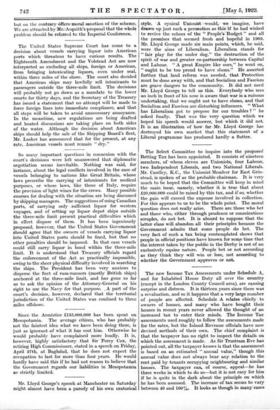So many important questions in connexion with the court's decisions
were left unanswered that diplomatic negotiation seems inevitable. Nothing was said, for instance, about the legal conflicts involved in the case of vessels belonging to nations like Great Britain, whose laws prescribe the carrying of intoxicants for medical purposes, or whose laws, like those of Italy, require the provision of light wines for the crews. Many possible courses for dealing with the situation are being discussed by shipping managers. The suggestions of using Canadian ports, of carrying only .sufficient liquor for western voyages, and of setting up liquor depot ships outside the three-mile limit present practical difficulties which in effect dispose ipf them. It has been ingeniously proposed, however, that the United States Government should agree that the owners of vessels carrying liquor into United States ports should be fined, but that no other penalties should be imposed. In that case vessels could still carry liquor in bond within the three-mile limit. It is understood that Treasury officials regard the .enforcement of the , Act as practically impossible, owing to the sheer physical difficulty involved in searching the ships. The 'President has been very anxious to disperse the fleet of Arum-runners (mostly British ships) anchored at the three-mile limit, and has gone so far as to ask the opinion of the Attorney-General on his right to use the Navy for that purpose. . A part of the court's decision, however, declared that the territorial jurisdiction of the United States was confined to three miles offshore.














































 Previous page
Previous page